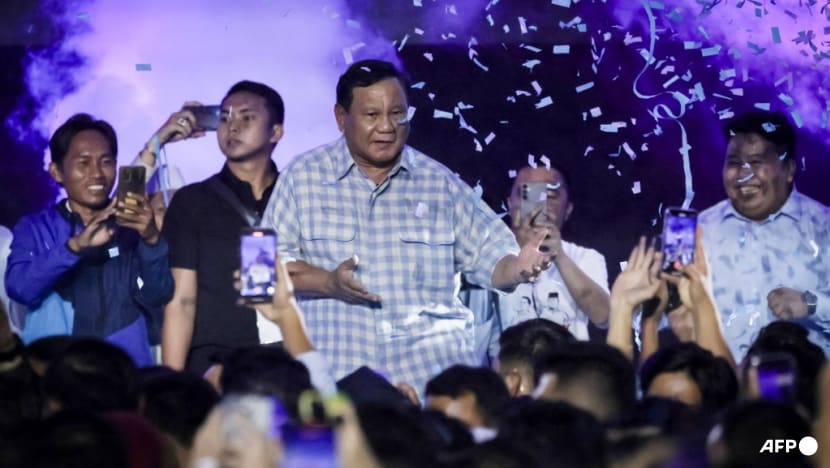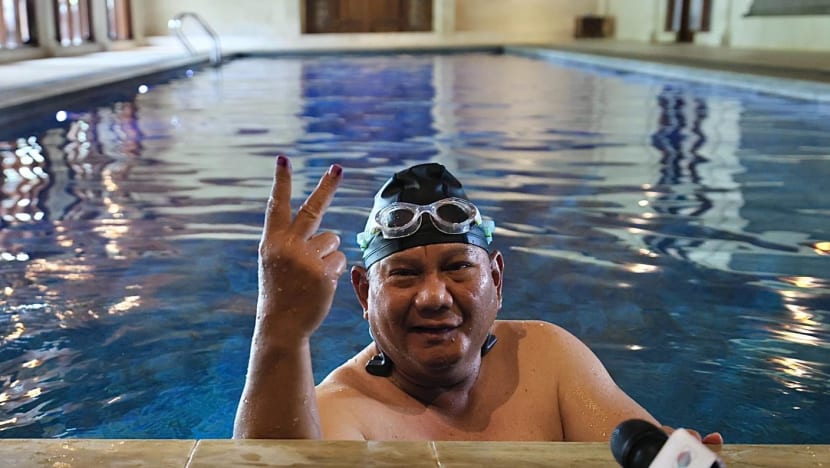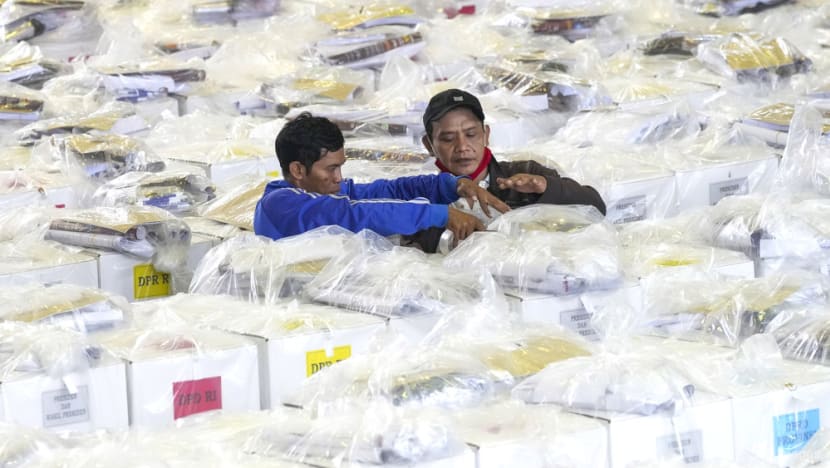Snap Insight: Prabowo looks set to be Jokowi 3.0 after huge lead in Indonesia presidential election
While the official presidential election result is yet to be confirmed, it looks highly likely that the near future of Indonesia will be significantly shaped by the dynamics between Prabowo Subianto and Joko Widodo, says Indonesia analyst Dedi Dinarto.

Presidential candidate and Indonesia's Defence Minister Prabowo Subianto (centre) during a gathering with supporters after polls closed in the country’s presidential and legislative elections in Jakarta on Feb 14, 2024. (Photo: AFP/Yasuyoshi Chiba)

This audio is generated by an AI tool.
SINGAPORE: Initial results from pollsters’ quick counts indicate that Prabowo Subianto, a former military general and persistent contender in Indonesia’s presidential race, has clinched a decisive victory over his rivals, Anies Baswedan and Ganjar Pranowo.
Exit polls show that Mr Prabowo, alongside his running mate, Gibran Rakabuming Raka, won around 60 per cent of the national vote. If the final results confirm that they won more than 50 per cent of the vote, Mr Prabowo and Mr Gibran will assume office in October this year.
While the official result might not come until next month, the strong likelihood is that we are seeing how the public perceives Prabowo-Gibran as the successor to President Joko Widodo, who has served Indonesia for two terms. But would Mr Prabowo be a worthy successor to Mr Jokowi?


JOKOWI 3.0
In their campaign platform, Mr Prabowo and Mr Gibran pledged to uphold Mr Jokowi’s policies, emphasising “continuity” as the cornerstone of their political agenda.
Mr Jokowi’s influence would persist in a Prabowo administration via his eldest son, Mr Gibran. As the vice president, Mr Gibran’s role would be pivotal in shaping policy decisions, ensuring that Mr Prabowo’s administration remains under Mr Jokowi’s oversight.
Mr Prabowo’s priorities align closely with Mr Jokowi’s emphasis on advancing value-added manufacturing, expanding infrastructure, and developing the new capital, Nusantara. However, certain campaign promises, such as a free school lunch programme, should be taken with a grain of salt because they are unlikely to be financially viable and would potentially strain the state budget.
Under Mr Prabowo, Indonesia would continue to court foreign investment to foster economic growth. Mr Prabowo is likely to strengthen trade and investment ties with China, building on the groundwork laid by Mr Jokowi over the past decade.
However, closer economic cooperation with China will not come at the expense of weakened ties with other countries. Like his predecessors, Mr Prabowo would not compromise Indonesia’s foreign policy principle of non-alignment. He would continue to engage with all countries, as long as there are political and economic benefits coming from the cooperation.
FORMING A PARLIAMENTARY COALITION
To ensure the stability of an administration under him, Mr Prabowo is expected to emulate Mr Jokowi’s footsteps of forming a broad coalition in parliament. Working with political parties supporting his rivals is essential for effective governance and the enactment of laws and regulations.
Should Mr Prabowo succeed in forming the grand alliance, it will result in weakened parliamentary opposition. However, failing to do so would create a strong opposition in parliament, which could prevent his administration from running effectively.
Despite the anticipated continuity, a Prabowo-Jokowi alliance faces inherent risks. In Indonesia, political alliances tend to be transactional and hence susceptible to change. Considering Mr Prabowo’s ambitious and self-directed personality, it is plausible for Mr Prabowo if he becomes president to eventually assert independence from Mr Jokowi’s influence.
The future of Indonesia in the next five years will be significantly shaped by the post-election dynamics between Mr Prabowo and Mr Jokowi. The succession of Mr Jokowi’s legacy under Mr Prabowo will depend on how committed both men are to their alliance.
Barring any friction cropping up in their alliance or any shocks in the final outcome of the election, 270 million Indonesians will see an echo of Mr Jokowi’s administration in the next five years, this time under different leadership.
Dedi Dinarto is an associate and lead Indonesia analyst at public policy advisory firm Global Counsel.



















